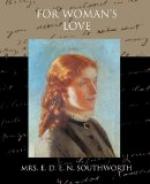The bride went down stairs, where the bridegroom awaited her. There, in the hall, were collected the members of her family, friends, neighbors and wedding guests.
Some time was spent in bidding good-by to all these.
“But it is not good-by, really; for the majority of us will follow by a later train, and be on hand for the inauguration to-morrow,” said old Aaron Rockharrt, who seemed to have recovered his youth on this proud day.
“And, grandpa, be sure to bring grandma. Don’t say that she is too old, or too feeble, or too anything, to travel, because she is not; and she has set her heart on seeing the pageantry to-morrow. Promise me before I leave you,” pleaded the bride.
“Very well; I will bring her,” said Mr. Rockharrt, who would have promised anything to his granddaughter on this auspicious occasion.
“You will find your traps all right, Cora. They went off by the early train this morning,” said Mr. Clarence.
“And I trust, Rothsay, that you will find my town house comfortably prepared for your reception,” said Mr. Rockharrt.
The bridegroom handed his bride into the carriage that was to convey them to the railway station. The carriage crossed the ferry, and in a few minutes reached the other side, and rolled toward the railway station.
The road was at this hour very solitary, and the bridegroom and his bride found themselves for the first time that day tete-a-tete. He turned to her, and drew her head to his heart and whispered:
“Cora, speak to me! Call me your husband!”
“I—cannot. My heart is too full,” the girl muttered evasively.
But his grand, simple, truthful spirit perceived no prevarication in her words. If her heart was full, it was with responsive love of him, he thought. He bent his face lower over her beautiful head, that lay upon his bosom, and kissed her.
Soon they reached North End, where all the aged, infirm and infantile who could not come to the wedding were seated at their cottage doors, to see the carriage with the bridegroom and bride go by.
Smiling and bowing in response, the pair passed through the village and went on their way toward the station which they reached at half-past one o’clock.
They had to wait about ten minutes for the train to come up. They remained in the carriage; for here, too, a small crowd of country people had collected to see the bride and the bridegroom, who was also the governor-elect.
The train from the East ran into the station. The bridal pair left the carriage and went on the cars, and the governor-elect and his bride set out for the State capital. It was a long afternoon ride, and the sun was low when the train drew in sight of the State capital, and slowed into the station.
An immense crowd had gathered to welcome the governor-elect, and as he stepped out upon the platform, and stood with his bride on his arm, the cheers were deafening. When these had in some measure subsided, the hero of the hour returned thanks in a simple little speech. Then the committee of reception came up and shook hands with the governor-to-be, who next presented them in turn to his wife.




